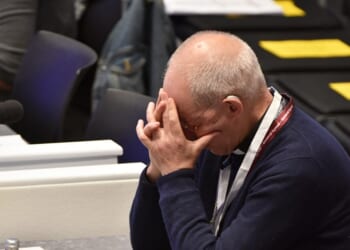More than 130 nuclear test veterans and their families reunited in Weston-super-Mare this week, thanks to the generosity of GB News viewers.
Last year, the campaign group fighting for justice for the veterans, LABRATS International, appealed to GB News viewers and listeners for donations to help cover the cost of the “All Tests Reunion”.
The reunion is the chance for those who were witnesses to Britain’s atomic bomb testing to catch up and renew their fight for answers.
In just a few hours, the People’s Channel audience raised almost £50,000, covering the cost of the reunion entirely.
Brian Unthank is just one of the 22,000 servicemen who were sent to Australia and the South Pacific in the 1950s and 1960s.
Exposed to radiation in just a short-sleeve shirt and a pair of shorts, he was on Christmas Island when the hydrogen bomb was tested and told GB News he remembers seeing a “flash” of white light with such a “brilliance”, you wouldn’t be able to describe it “if you lived to one million years old”.
Describing the aftermath of the bomb, he said: “There’s a big, thick black line hurtling toward you from 20 miles away.
“It hits you. It burns you. It throws you into the ground like a piece of rag doll.”
LATEST DEVELOPMENTS

Brian Unthank is one of the 22,000 servicemen who were sent to Australia and the South Pacific
|
GB NEWS
Today, veterans like Brian and their families live with the untold consequences of their service.
Brian told GB News: “I was a gummy child at the age of 20. I had lost all of my teeth within three months of coming back from Christmas Island.
“My first wife had more than a dozen miscarriages. I have a daughter who was born with two wombs and a son who was born with holes in his heart.
“I have another granddaughter now at the age of nine; her teeth are crumbling like chalk.”
Captain Terry Hughes was 19 when he was sent to Christmas Island in the Pacific with the Royal Fleet Auxiliary.
Now 86, he said: “I’ve had lots of skin cancers, of course, and my other son can’t have children.
“He’s got multiple cases of Deep Vein Thrombosis, he’s got lung problems and teeth problems as well, which are symptoms of what we’ve been going through.
“It’s [effects of radiation exposure] all going through the genes.”

Captain Terry Hughes was only 19 when he was sent to Christmas Island in the Pacific
|
GB NEWS
But out of those experiences has come a family of veterans and descendants who are determined to get answers.
The reunion was filled with updates on the campaign, a quiz and an evening of entertainment where it’s tradition everyone dresses up in Hawaiian shirts and takes part in some traditional Kiribati dancing, seen on Christmas Island where many of the tests took place.
This week has also marked a huge step in the push for more education in schools about the tests, with the launch of a book and online resources.
Alan Owen is the founder of the campaign group, LABRATS International.
He said: “What we want is to be able to get a copy of the book into every secondary school in the UK. That’s our goal.
“It’s a high goal, there’s a lot of secondary schools in the UK, but that’s our goal and we’re going to start with the pilot in Swansea and build it out from there.
“There’ll be another event in Manchester in November where again we will move it out, and the idea is that this book will be in every school in the UK within the next few years, that’s what we’re aiming for.”

Alan Owen wants to get a copy of the LABRATS book in every school in the UK
|
GB NEWS
For descendant, actor and campaigner, Steve Purse, it’s a chance to ensure future generations know about the tests and their impact.
He told GB News: “We had a program, we invented our own weapons, we test our own weapons, and that is how we have got a British nuclear deterrent.
“Very, very few people realise that, and it’s important for the next generation to know what’s keeping them safe, to know where the nuclear deterrent came from.
“It is a part of our history and no part of history is to be airbrushed out.”
A Ministry of Defence spokesman said they recognise the contribution the nuclear test veterans have made to national security and that the Government is committed to working with veterans and listening to their concerns.
They add officials have been commissioned to look into unresolved questions regarding medical records as a priority, and this work would be “comprehensive.”

















